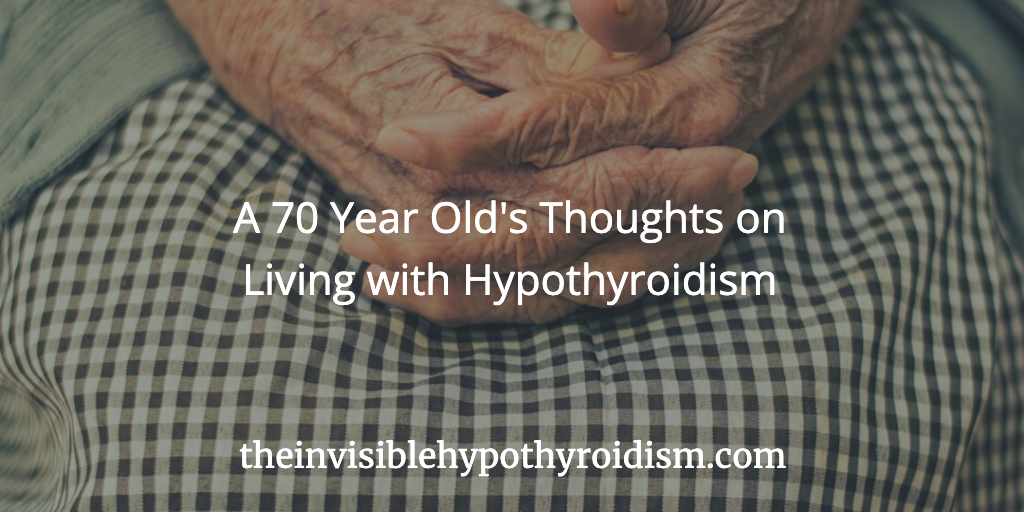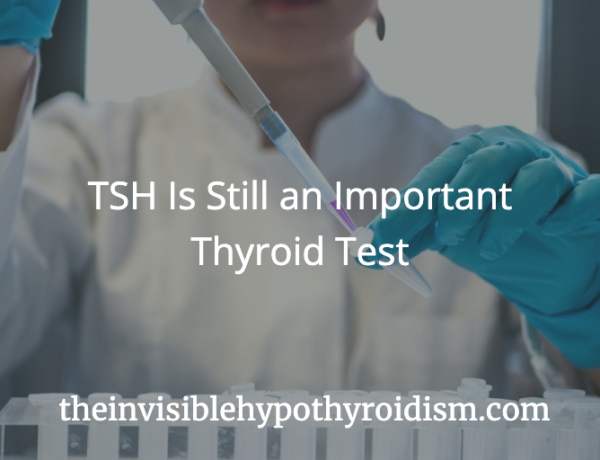Originally published on 12th December 2017 Last updated on 23rd February 2024
I’d like to thank the lovely Margaret for featuring in this blog. I’ve known Margaret through my online support group for thyroid patients, for years now and she’s come a long way in advocating for her thyroid health in that time.
I do feel that older thyroid patients’ voices aren’t heard enough, in regards to their experience of living with the condition for so long, which I’m sure we can all learn from.
So thank you, Margaret, for letting me ask you some questions on living with hypothyroidism as an older member of the thyroid community.
Hello Margaret, can I start by asking how old you are?
I am seventy-years-old.
And how old were you when you were diagnosed with Hypothyroidism?
Forty.
Do you have any other health conditions or concerns at the moment?
I have just had a gall bladder op and have issues with my hips and knees so I’m awaiting appointment for physio for these.
Looking back, do you think any major life events or anything in particular triggered your Hypothyroidism?
Perhaps my second pregnancy or the taking the contraceptive pill. I lost weight after having my second child, then the doctor actively encouraged me to take the pill. Each month I took it I gained more weight, so I suspect this began my hormonal imbalances. I stopped taking it after a couple of months.
Another doctor then prescribed me some diet pills for the weight gain, which did nothing to help, but I eventually stopped worrying about it as my weight stabilised. My periods at this time were six weekly, another sign. When I was expecting my third child, a trip to the hospital two months in revealed that the baby’s developmental age was only four weeks. This indicates that I was likely hypothyroid at this point since it can affect pregnancy negatively and the rate at which a baby develops. I don’t know if this is related but I also had caesareans with all of my children.
Do you know if your case is autoimmune? I.e caused by Hashimoto’s, the leading cause of hypothyroidism throughout the world.
I have not been given this diagnosis so don’t know.
Can you explain what your diagnosis and initial treatment was like? What symptoms did you have?
I was diagnosed when I went to the doctor with one of my children being unwell.
The doctor said that he did not like the look of me and that I had Myxoedema, a result of longstanding, low levels of thyroid hormones.
He did suggest that I take a photo of myself and said that I would notice a lot of difference in comparison to older photos. My face at this time was so puffy that my eyes had disappeared into my face and it took me thirty minutes to walk what should have been a fifteen minute distance. My legs ached when I walked up stairs and I was very constipated.
At this time, I knew that I was quite unwell but as we were due to go on holiday I did not go to see the doctor until I was back. I was started on a low dose of Levothyroxine which was increased over the months to 150 micrograms. He said that my blood level was 2 when it should be over 12, so I presume that must have been my Free T4 level. A very low level indeed which explains the symptoms. When diagnosed, it was just “take this tablet for the rest of your life”.
How may your treatment have changed over the years? Have you implemented any changes yourself to help manage your condition?
I was initially on 150mcg of Levothyroxine for a few years but then I stopped working to help my husband with his business and the doctor reduced it to 125. As a result, I regained the weight I had lost although it had been stable since being diagnosed. I was at this dose of Levothyroxine for the next eight or nine years, then it was increased back to 150mcg. After moving house, I was reassigned to a different doctor who reduced my dose back to 125mcg but after awhile my body ached so much that he increased it back to 150.
This yoyo effect of changing the dose after each blood test continued for the next four years.
Then as I had a different doctor, the dose was reduced back to 125mcg and although I had gained hypothyroid symptoms from this, she would not increase the dose and she said that ideally she wanted to reduce the dose but did not.
I was referred to a nurse for information on how to control my cholesterol, although the diet advice she gave me was my natural diet anyway.
I went back to my old doctor as I was feeling quite unwell, my body was aching so much, I had gained all the weight that I had lost and the only way that I could eat my food was to drink loads of water with it as the food tended to get stuck in my throat from my poor thyroid. The doctor increased the dose back to 150mcg again and then I continued with the yoyo of doses for another nine years.
Then just last year l went to the doctor because I was so exhausted and he reduced my dose again but suggested that I reduce it slowly. At this point he also referred me to an endocrinologist as my TSH was 0.01.
After being on this lower dose, regaining hypo symptoms and getting to the point of choking on my food, I decided to try NDT (self-sourced) and was on this from August 2016 until April 2017. I told my doctor about it.
I sadly didn’t get on too well with it, though. In September 2016 I saw an endocrinologist who only wanted to reduce my Levothyroxine but as I was on NDT she discharged me as she said she could not prescribe T3 (which I wanted to switch to). I did manage to get her to test my Free T3 level though and also Vitamin D, B12, ferritin and folate as these had never been tested. As I had not heard from the endo about these results, I had them tested privately as well and as a result I found that I had very high levels of ferritin. Something else for investigation.
After seeing a different endocrinologist in February 2017, I changed to a combination of Levothyroxine (T4) and T3.
Have you noticed the way in which medical professionals approach and treat hypothyroidism change over the thirty years you’ve been diagnosed?
To be honest, I have never noticed much change as to how the GP’s approach hypothyroidism and thought that I was very fortunate that the doctor listened to me and changed my dose when I became unwell, but on reflection it would have been better if he had referred me to an endocrinologist sooner.
The doctor did eventually refer me, after my first endocrinologist visit and when I found out about my high levels of ferritin he was more concerned about my low TSH so referred me to another endocrinologist. This new endocrinologist has been very good and has given me the option of going back on 150mcg of Levothyroxine, go back to NDT or try T3 added to the Levothyroxine which is the course of action I chose. He did also order a blood test for adrenal function. He only orders Free T4, Free T3 and TSH so I do not know what my D, B12, ferritin and folate levels are as of now.
How did having such hypothyroidism impact your work, personal and social life? Did it have an impact on your family dynamics?
This is a difficult question to answer as I feel that I was undiagnosed for thirteen-years.
When I had my hysterectomy about five years after I first developed symptoms, the surgeon told me off for having too much fatty tissue and that I should eat properly. I know that it took a long time to recover from this and my scar has never been right.
I know that although I did my best, I am sure that I could have done more with the children but I just lacked the energy.
I went to a keep fit class and struggled to keep up with everyone. I was in control of our finances but after our second child was born, my husband took it over as I couldn’t keep on top of it mentally anymore.
Socially I was always known as ‘Poor Margaret’ when the children were young and people always thought that I could not do things i.e. make clothes for them, when other mothers could.
When I applied for a job once, I nearly didn’t get it because of how unwell I looked. Recently, when my husband saw a photo of me when the children were small, he did not recognise me. Also, when they were young, my brother told my mother that I had let myself go after the birth of my second child. But I was just very ill.
The doctor had even put me on antidepressants.
The following year, I got flu and as the doctor thought I had a nervous breakdown, he sectioned me and I was sent to a mental hospital, where they said that all I had was the flu. A few years later, I got the flu again and was prescribed antidepressants once more. I believe I was experiencing it on top of mismanaged hypothyroidism which was just a bit too much for me to cope with.
Is there anything you wish you’d have known earlier on in your thyroid journey?
I wish wish wish that I had been diagnosed earlier and then I would have been a better mother to my children.
If you could, would you go back and change anything in relation to your health conditions?
I wish I had more information on the condition when I was newly diagnosed and I wish I was diagnosed sooner.
For newly diagnosed patients, I would suggest that they research the condition throughly and accept that you need to listen to your body.
When you feel tired, take a quiet day and don’t get too upset with yourself about how your body is, as it does not change the person you are.
Thank you, Margaret.
I think you’ll agree with me that Margaret has really given a thorough and, in some places, heart breaking insight in to living with hypothyroidism over such a long period of time, particularly being so poorly managed for so long.
Only in her late sixties was she able to reach out to an online support group, learn more than she’d ever known about her condition and start to advocate for herself, asking the doctor to try different medications or even order some of her own testing, so that she could take back some control.
It is never too late to fight for the quality of life that we all deserve. I hope that Margaret sharing her story with us has reassured you of this.
What did you think to Margaret’s story? Share your thoughts in the comments section below.
You can click on the hyperlinks in the above post to learn more and see references to information given.
If you would like to submit a guest post, whether you’re a thyroid patient, doctor or anyone else, please get in contact.




